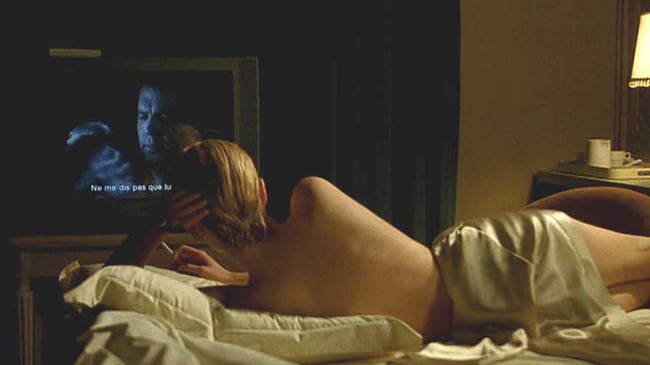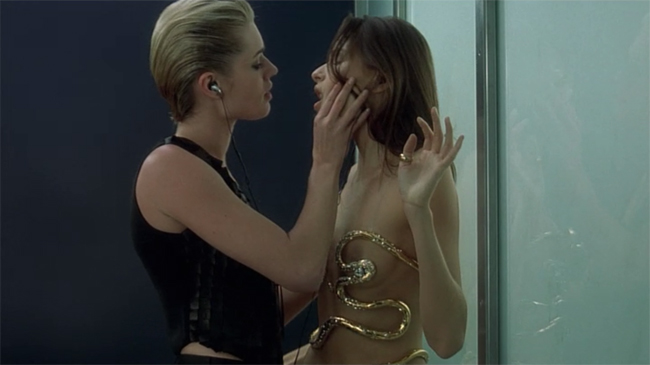Femme Fatale
Written and directed by Brian De Palma
France/Switzerland, 2002
A sexy thief strips a woman of her golden underwear as her cohort collects them from the other side of the bathroom stall at Cannes. That the absurd, amusing, and schlocky sexuality of the opening heist in Femme Fatale comes from the mind of director Brian De Palma is hardly surprising.
De Palma is often seen in red carpet shoots of film festivals, slouching around from screening to screening. In short, he is still just a movie nerd, and always has been. This has been evident since his early work, often at the time dismissed as Hitchcockian riffs. 2002’s Femme Fatale is easily the quintessential De Palma film. It also happens to be the looniest, and funniest, of his oeuvre.
The thief in question, Laure Ash (Rebecca Romijn-still-Stamos), is the eponymous Barbara Stanwyck writ large and filthy. Almost immediately after the convoluted robbery, she double-crosses her partners and flees to Paris. Through a series of further noir-ish complications, she trades places with her convenient doppelgänger. Soon after, she is heavily involved in more seductive double-crossing as she manipulates a photographer, Nicolas (Antonio Banderas), seemingly for the sake of a good laugh. The level and execution of betrayal in Fatale at this point have already become mind-numbing, intentionally too hard to get a grasp on. However, the opening heist at Cannes lays it out very clearly to the audience: folks, you’re watching a movie.
It’s fitting, then, that Fatale follows two unsuccessful attempts at more mainstream blockbusters. Roger Ebert wrote of Snake Eyes that, had De Palma been half as good at rewriting as he were at visual style, it would have been “a heck of a movie.” Here, De Palma does away with any blockbuster desire, going through his own looking glass and into a funhouse mirror of what makes De Palma De Palma. Every fetishistic theme and obsession is packed into reference upon homage. In a rare twist, the lacking performances by the two leads (Romijn fares the worst here) actually help the film’s over-the-top, everything but the kitchen sink approach. It approaches levels of tongue-in-cheek of which Basic Instinct could have only dreamt.
That’s to say nothing of a climax that involves every happenstance and deux ex machina that can fit onto a split screen. De Palma has always been known, even in his lesser efforts, for a rousing last act. That some are far fetched (a sundial approaching the hero’s neck is randomly shot in two in Raising Cain) and others are simply bizarre dream sequences rarely takes away from the sheer joy of their construction.
— Kenny Hedges




